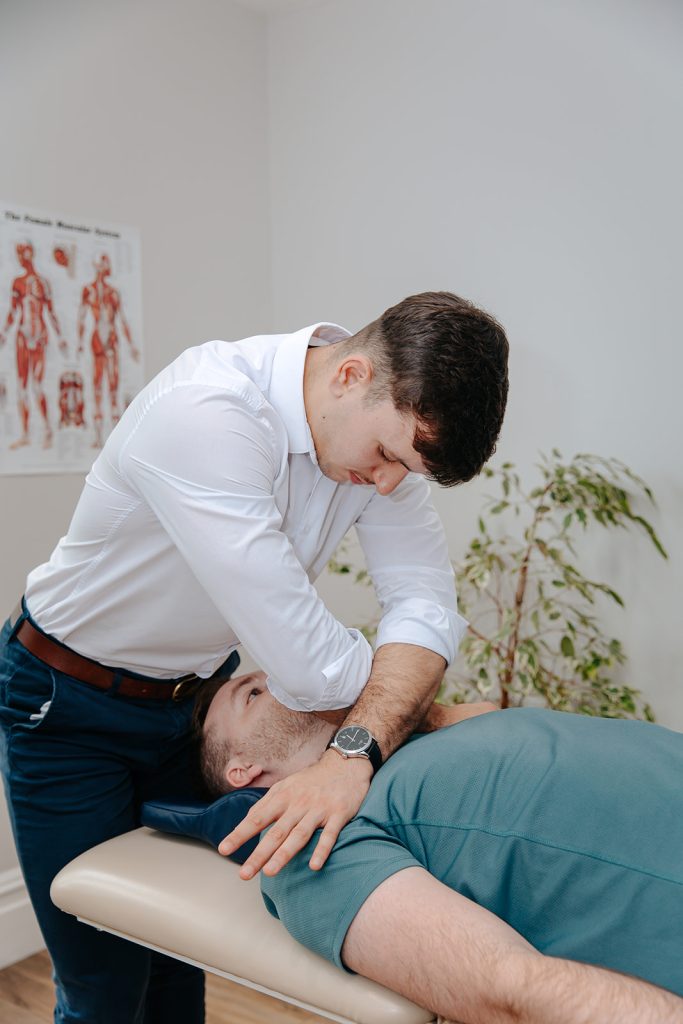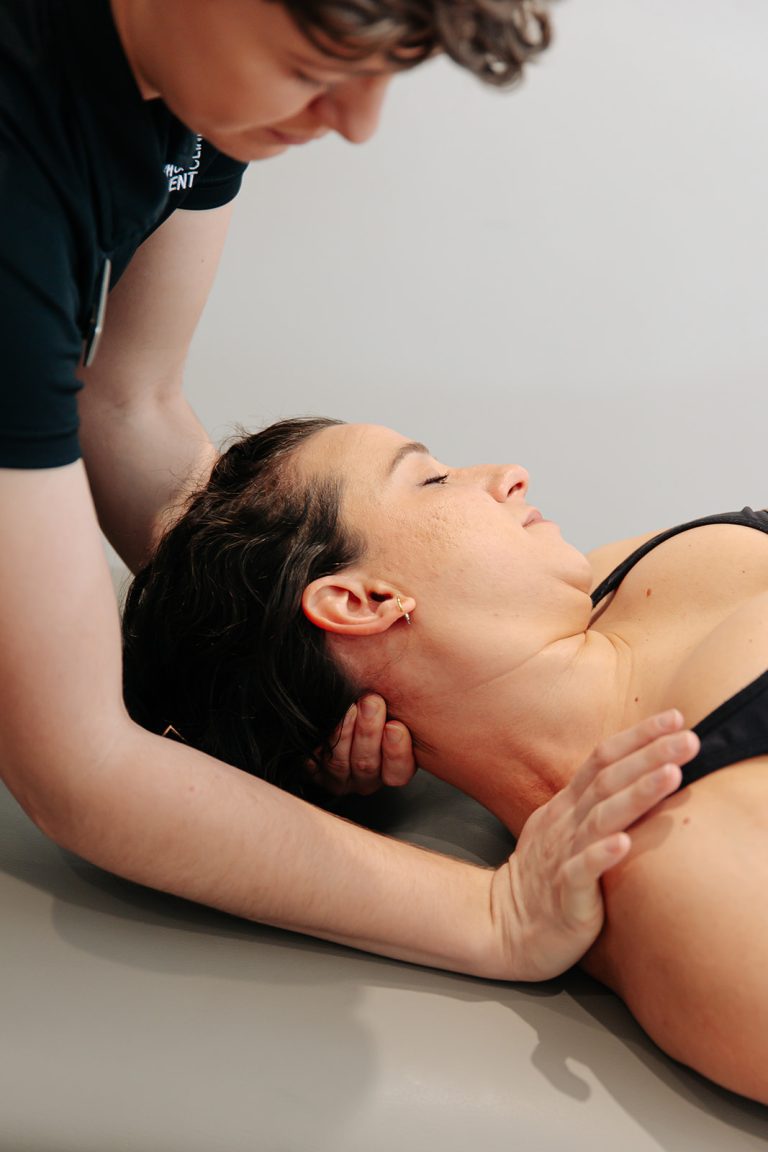Steph Hatt
March 22, 2020

NECK PAIN SPECIALISTS
Are you tired of living with persistent neck pain that’s affecting your daily life?
Our neck pain specialists understand how debilitating neck pain can be and are here to help you find lasting relief.
We’ll start with diagnosis, then offer tailored neck pain treatment to meet your unique needs.
Are you:
Ready to take the first step toward pain-free living and improved mobility?
Book your appointment today and discover the difference physio for neck pain can make.

Visit a neck pain specialist at our Devizes clinic in Couch Lane.

Visit a neck pain specialist at our Frome clinic in Wallbridge.

Visit a neck pain specialist at our Marlborough clinic in Hughenden Yard


Neck pain can affect anyone at any stage in life but has the highest prevalence in office workers, individuals with poor posture and older adults.
Neck pain can have various causes, and the specific reason for the pain will depend on factors such as age and lifestyle. Some common causes of neck pain include:
– Impact or trauma
– Sudden or vigorous neck movement
– Prolonged awkward positions
– Long-term posture issues
– Disc protrusion
– Joint related e.g. stiffness, inflammation, degeneration
– Muscular spasm
– Wry or cricked neck (also known as Torticollis)
Find out more about our treatment options that can help with neck pain:
We’ll start by understanding your medical history
We’ll then identify what is causing your neck pain and give you a clear diagnosis
You’ll receive hands on treatment to relieve any stiffness, aches and pains in your neck
We’ll put together a personalised treatment plan to address your specific neck pain issues
You’ll receive ongoing support from our team to resolve your neck pain and prevent future injuries



Neck pain can be caused by a variety of factors, including poor posture, muscle strain, stress, injury, poor sleep habits, and underlying medical conditions such as arthritis or nerve compression. Spending long hours hunched over a computer or smartphone, sleeping in an uncomfortable position, or lifting heavy objects improperly can all lead to neck pain.
When the muscles in the neck are tense or strained, they can cause pain that radiates to the head, resulting in a headache. This type of headache is often referred to as a tension headache and is a common symptom of neck issues.
To sleep with neck pain, it’s important to maintain proper sleeping posture and try the following tips:
– Use a supportive pillow that keeps your neck in a neutral position.
– Avoid sleeping on your stomach, as it can strain your neck.
– Use a supportive mattress that keeps your spine aligned.
– Apply heat to the affected area before bed.
– Practice relaxation techniques before bedtime to alleviate stress and tension in your neck muscles.
– Consider gentle neck stretches or exercises during the day to improve neck flexibility and reduce pain.
– If the pain persists, consult with us for further evaluation and treatment options.
Neck pain can cause dizziness and this is due to certain structures placing pressure on blood vessels – restricted the blood flow to the brain. This can be triggered by certain movements, such as turning the head quickly or looking up for a prolonged period of time.
You can reduce neck and shoulder pain through trying the following methods:
– Apply ice or heat to the affected area.
– Practice proper posture and ergonomics when sitting and standing.
– Stretch and do exercises to strengthen the neck and shoulder muscles.
– Get a professional massage or try self-massage techniques.
– Use over-the-counter pain relievers or anti-inflammatory medications.
– See a Physiotherapist for specific exercises and treatments.
– If the pain persists or worsens, book an appointment with us for a proper diagnosis and treatment plan.
If you are experiencing cervical neck pain that is affecting your sleep, here are some tips to help you get a better night’s rest:
– Choose the right pillow: Use a pillow that supports your neck and keeps your head in alignment with your spine.
– Improve your position: Try sleeping on your back or side with a pillow between your knees to relieve pressure on your neck.
– Practice good sleep: Create a relaxing bedtime routine, limit screen time before bed, and keep your bedroom cool, dark, and quiet.
– Use heat therapy: Apply a heating pad to your neck before bed to help reduce pain and inflammation.
– Try neck stretches and exercises: Gentle stretching and strengthening exercises can help improve flexibility and reduce stiffness in your neck.
– Consult a healthcare professional: If pain persists, consider talking to one of our Physiotherapists for advice on managing your pain and improving your sleep quality.
When you are stressed, your muscles tend to tense up, which can lead to tension in the neck and shoulders. This tension can result in neck pain and discomfort. You can manage stress through relaxation techniques, exercise, and other stress-reducing activities to help alleviate neck pain.
While neck pain itself may not directly cause migraines, it can be a contributing factor. Tension and muscle strain in the neck and shoulders can trigger or exacerbate migraine headaches in some people.
Sinus issues are a common problem for many people, often causing a variety of symptoms, such as congestion, headache, and facial pressure. However, it can also lead to neck pain. When sinuses become inflamed or infected, the surrounding areas of the face and neck can also become inflamed, leading to discomfort and pain.
Anxiety can lead to muscle tension, which can result in neck pain. When someone is stressed or anxious, they may unknowingly tense the muscles in their neck and shoulders, leading to discomfort and pain. There are various relaxation techniques that can help alleviate this tension, such as taking slow, deep breaths.
Neck pain from stress can feel like a dull ache or a sharp, stabbing pain in the neck and shoulders. It may also be accompanied by tension, stiffness, and limited range of motion in the neck. Stress-related neck pain can also cause headaches and muscle spasms in the neck and upper back.